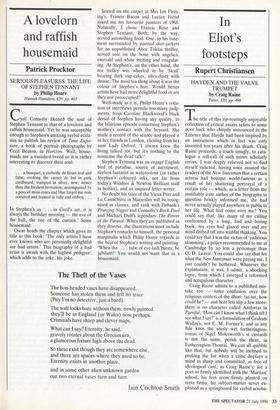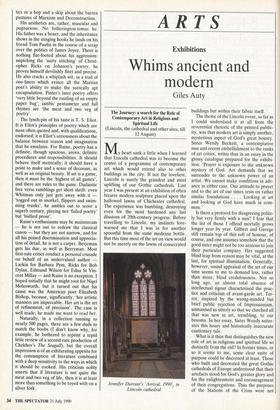In Eliot's footsteps
Rupert Christiansen
HAYDEN AND THE VALVE TRUMPET by Craig Raine Faber, £20, pp. 498 he title of this rip-roaringly enjoyable collection of critical essays refers to some poor hack who chirpily announced in the Listener that Haydn had been inspired by an instrument which in fact was only invented ten years after his death. Craig Raine proceeds, a touch smugly, to cata- logue a roll-call of such minor scholarly errors. I was deeply relieved not to find myself indicted, having once assured the readers of the New Statesman that a certain actress had become world-famous as a ' result of her shattering portrayal of a certain role — which, as a letter from the justifiably irate author of the biography in question briskly informed me, she had never actually played anywhere in public in her life. What had come over me? You could say that, like many of my calling confronted by a long, bad and boring book, my eyes had glazed over and my mind drifted off into wishful thinking. You could say that I was the victim of 'judicious skimming', a policy recommended to me at Cambridge by no less a personage than Q. D. Leavis. You could also say that for what the New Statesman were paying me, I just couldn't be bothered. Whatever the explanation, it was, I admit, a shocking lapse, from which I emerged a reformed and scrupulous character.
Craig Raine admits to a published mis- take too — some confusion over the religious context of the dhoti: tut-tut, how could he? — and here lets slip a few more: there is no character called Antfortas in Parsifal; 'How can I know what I think till I see what I say?' is a formulation of Graham Wallas's, not E. M. Forster's; and as any fule knos the uterly wet fortherington- tomas of Nigel Molesworth's st custards is not the same, perish the thort, as Fotherington-Thomas. We can all quibble like that, but nobody will be inclined to prolong the list when a critic displays a mind as sharp and committed, as free of ideological cant, as Craig Raine's: for a poet so firmly identified with the 'Martian' school, his feet seem firmly planted on terra firma, his subject-matter never ex- ploited as a springboard for verbal acroba- tics or a hop and a skip about the barren pastures of Marxism and Deconstruction.
His aesthetics are, rather, muscular and pugnacious. No fotherington-tomas he. His father was a boxer, and the inheritance shows in the stinging hooks he lands on his friend Tom Paulin in the course of a scrap over the politics of James Joyce. There is nothing flat-footed about his aggression: unpicking the 'natty stitching' of Christ- opher Ricks on Johnson's poetry, he proves himself devilishly fleet and precise.
He also cracks a whiplash wit, in a trail of one-liners which evince all the Martian poet's ability to make the surreally apt encapsulation. Pinter's later poetry offers 'very little beyond the rustling of an empty paper bag'; iambic pentameter and full rhymes are 'the meat and two veg of poetry'.
The lynch-pin of his taste is T. S. Eliot. It is Eliot's principles of poetry which are most often quoted and, with qualifications, endorsed; it is Eliot's seriousness about the balance between reason and imagination that he emulates. For Raine, poetry has a definite, though spacious, arena, definite procedures and responsibilities. It should behave itself metrically; it should have a point to make and a sense of decorum, as well as an original beauty. If art is a game, then it must be the 'highest of all games', and there are rules to the game. Dadaistic free verse ramblings get short shrift: even Whitman only just gets away with it 'togged out in snorkel, flippers and swim- ming trunks', he ambles out to score a superb century, playing not 'failed poetry' but 'bullied prose'.
Raine's enthusiasms may be mainstream — he is not out to redraw the classical canon — but they are not narrow, and for all his poised discrimination and apprecia- tion of detail, he is not a carper. Betjeman gets his due, as well as Berryman. Most first-rate critics conduct a personal crusade on behalf of an undervalued author - Larkin for Barbara Pym, Ricks for Bob Dylan, Edmund Wilson for Edna St Vin- cent Millay — and Raine is no exception. I hoped initially that he might root for Nigel Molesworth, but it turned out that his cause was the American poet Elizabeth Bishop, because, significantly, 'her artistic manners are impeccable. Her art is the art of refinement, of precision'. The case is well made; he made me want to read her. Naturally, in a collection running to nearly 500 pages, there are a few duds to match the boobs (I don't know why, for example, he bothered to reprint a tepid little review of a second-rate production of Chekhov's The Seagull), but the overall impression is of an exhilarating appetite for the consumption of literature combined with a deep sensitivity to the ways in which it should be cooked. His criticism nobly asserts that if literature is not quite the meat and two veg of life, then it is at least more than something to be toyed with on a silver fork.



















































 Previous page
Previous page